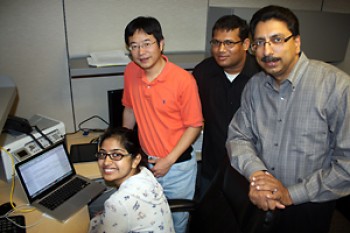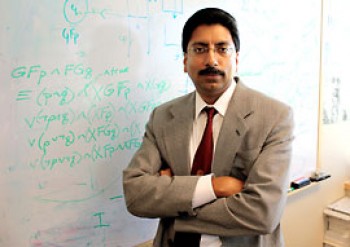Ph.D. - Computer Science
University of North Carolina at Chapel Hill - 1991

Professional Preparation
M.S. - Computer Science
University of North Carolina at Chapel Hill - 1987
University of North Carolina at Chapel Hill - 1987
B.Tech - Computer Science
Indian Institute of Technology, Kanpur - 1985
Indian Institute of Technology, Kanpur - 1985
Research Areas
Research Interests
- Programming Languages: Implementation and Semantics, Logic Programming, Constraint Programming, Applications, Compile-time Analysis.
- Software Engineering: Software Verication, Domain Specic Languages, Executable Specications, Agent/Web/Service based Computing, Interoperability.
- Parallel and Distributed Processing: High Performance AI and Logic Programming Systems, Automatic Parallelization and Parallelizing Compilers, Parallel Architectures, Applications.
- Human Computer Interaction: Tools for Visually Impaired; Intelligent Interfaces.
- Artificial Intelligence: Logic based Intelligent systems, constraint satisfaction, constraint programming, implementation
Publications
G. Gupta. Language Based Software Engineering. Sci. of Computer Programming
Journal. Elsevier. To appear 2014. 2014 - Publication
S. Kona, A. Bansal, G. Gupta. USDL: A Service-Semantics Description Language for
Automatic Service Discovery and Composition. International Journal of Web Services
Research. Jan 2009. 6(1): 20-48. 2009 - Publication
H-F Guo, G. Gupta. Dynamic Reordering of Alternatives for Definite Logic Programs,
Journal of Computer Languages, Elsevier, 35(3):252-265 (October 2009) 2009 - Publication
S. Kona, A. Bansal, B. Blake, G. Gupta, Generalized Semantics-based Service Composition. May 2008. 2008 - Publication
H-F. Guo, G. Gupta. Simplifying Dynamic Programming via Mode-directed Tabling. Software Practice and Experience. 38(1): 75-94 (2008). Jan 2008. 2008 - Publication
E. Pontelli, K. Villaverde, H. Guo, G. Gupta. Stack Splitting: a Technique for Efficient Exploitation of Search Parallelism on Share-nothing Platforms. Journal of Parallel and Distributed Computing. 2006. pp. 1267-1293. 2006 - Publication
L. Simon, A. Mallya, A. Bansal, G. Gupta. Coinductive Logic Programming. In Proc. Int'l Conference on Logic Programming. 2006. Springer Verlag. pp. 330-345. 2006 - Publication
A Universal Service-Semantics Description Language 2005 - Publication
Appointments
Department Head
UT DAllas [2009–Present]
UT DAllas [2009–Present]
Associate Department Head
The University of Texas at Dallas [2004–Present]
The University of Texas at Dallas [2004–Present]
Professor
The University of Texas at Dallas [2002–Present]
The University of Texas at Dallas [2002–Present]
Associate Professor
The University of Texas at Dallas [2000–2002]
The University of Texas at Dallas [2000–2002]
Associate Professor
NMSU [1997–2000]
NMSU [1997–2000]
Assistant Professor
NMSU [1992–1997]
NMSU [1992–1997]
Member of Research Staff
University of Bristol [1989–1991]
Parallel Logic Programming Systems Group
University of Bristol [1989–1991]
Parallel Logic Programming Systems Group
Research/Teaching Assistant
UNC Chapel Hill [1985–1989]
UNC Chapel Hill [1985–1989]
Programmer
Uttar Pradesh Development System Corporation [1985–1985]
Uttar Pradesh Development System Corporation [1985–1985]
Projects
Condicutve Logic Programming and Its Applications
2018–2018 G. Gupta, L. Simon, A. Bansal, A. Mallya, R. Min. Condicutve Logic Programming and Its Applications. Slides from PADL'09 invited talk.Reissuing the 5th Generation Challenge: Next Generation of LP Systems
2018–2018 G. Gupta. Reissuing the 5th Generation Challenge: Next Generation of LP Systems. Talk given at DAMP'06.European Science Project Workshop on Math Accessibility
2008–2008 European Science Project Workshop on Math Accessibility, Paris, France, Feb. 2008.Workshop on Declarative Languages for Multicore Architectures
2006–2006 Workshop on Declarative Languages for Multicore Architectures, Jan 15, 2006. Charleston, SC.Workshop on Logical Spreadsheets
2005–2005 Workshop on Logical Spreadsheets, Sep 24, 2005. Stanford University, Palo Alto, CA.Additional Information
Honors and Awards
- President, Association for Logic Programming, 2010 onwards.
- Member, Executive committee, Association of Logic Programming, 2003-2007.
- Member, Executive Committee, European Association for Programming Languages and Systems.
- Junior Faculty Enhancement Award in Computer Sciences, Oak Ridge Associated Universities, 1992.
- Most Practical Paper Award, Sixth International Conference on Practical Aspects of Declarative Languages. 2004. (With H. F. Guo)
- Best paper Award, Software Verification and validation Workshop, 2003. (With Q. Wang).
- Best paper Award, 2005 European Conference on Web Services.
- Recipient of Graduate School Fellowship, University of North Carolina, Chapel Hill.
- Recipient of 'National Talent Search Scholarship', Government of India, 1981-1985.
- Ranked sixteenth nationwide (among 100,000 students) in the Joint Entrance Examination of Indian Institute of Technology (IIT- JEE)
Software Systems developed by my research group
- NEXUS parser: A parser for NEXUS (NEXUS is a bioinformatics mark-up language). This is old work (ca 2000), which has seen renewed interest by bioinformatics researchers. Pontelli, Gupta. Implemented in Prolog.
- ExSched Systems: An Excel Plug-in for Knowledgesheet (see below). A spreadsheet interface for solving constraint satisfaction problems. Chitnis, Yennamani, Gupta. 2006. VB .NET and CLP. Used by UTD CS and EE departments to automatically schedule courses (can handle large schedules; CS automatically scheduled 95 courses at a time, EE 75 courses).
- VoxBoox System: A system for automatically generating interactive talking books. Click here to see demo.
- DAWN System: A system that allows interactive audio/voice based aural surfing of the WWW over the phone. Prototype under development. Raman, Nichols, Reddy, Annamalai, Gupta. Implemented in Java and C.
- Semantic Web System: Semantically maps RDF documents and RDQL queries to Horn logic. The RDQL queries can then be executed w.r.t. RDF data. Kunal Patel and Gupta, 2003. Developed in Prolog. Available upon Request.
- The E-plan System: The E-plan system is a Web-based system for helping with emergencies involving hazardous chemicals. My group was part of a larger team that developed the system. System currently in active use by fire-fighters and hazmat responders in several states (TX, AR, NM, LA). Staves (EPA), Harris, Raghavachari, Gupta, and numerous students. Read an article about the system in Firechief magazine (a more recent one here in Industrial Fire World magazine) and how it was used for Hurricane Katrina releif.
- TA Scheduler: Automatically assigns to TAs to courses. Used at UTD since fall 2002 to make assignment for 70+ TAs to about 120 courses. Now has a web interface and a front end GUI. King, Gupta, Guballa, Mallya. 2003. An AI system developed in Prolog/CLP. Beta version available upon request.
- HTML to VoiceXML Transcoder: converts any HTML 4.0 web-page to VoiceXML. Extensible. Developed in Java (initial prototype in Prolog). Narayan, Gupta, Balakrishnan. Available upon Request.
- Transform: Bioinformatics interoperability tool (available through swbic.org). Pontelli, Gupta, Ranjan, Milligan (developed in Prolog/CLP). 2001.
- PALS: Parallel ALS, a distributed logic programming system based on the commercial ALS Prolog system. Implements full Prolog, and runs on Beowulf now (ca. 2002). Built on top of Applied Logic System's (ALS) WAM, uses MPI and the novel technique of stack-splitting to realize distributivity. Will be eventually available through ALS, Inc. Villaverde, Pontelli, Gupta, Guo.
- TALS: Tabled ALS, a tabled logic programming system based on the commercial ALS Prolog system. Implemented on top of ALS WAM, uses novel technique of dynamic reordering of alternatives. Guo and Gupta.
- NADA: An automatic system for checking undergraduate graduation requirements and providing advise automatically to students (built for NMSU). Implemented using Prolog + Java. Jose-Mendez, Karshmer, and Gupta. 1999.
- ACE: A High Performance Parallel Prolog System implemented on top of SICStus Prolog. Runs on SMMs. Pontelli and Gupta. No longer maintained or available.
- VACE: A tool for visualizing and-or parallel execution of logic programs. Runs on daVinci. Vaupel, Pontelli, Gupta. No longer maintained or available.
- Knowledgesheet: A Spread-sheet based tool for solving constraint satisfaction problems (patent pending). Akhtar and Gupta.
- Nemeth to Latex Backtranslator: A system for converting Nemeth Math Braille document to Latex. Implemented in Prolog/CLP. 2001. Try the expression coverter here: Nemeth Math to Latex Backtranslator (alpha). Commercialization efforts also under way. 2002. Guo, Karshmer, Gupta.
- An Interpreter for EqL: EqL is an equational language. Gupta and Jayaraman. 1987. The system was distributed to about 20+ places. No longer maintained. Implemented in C.
News Articles
Prof's Startup Untangles Problems With Old Software
 When Dr. Gopal Gupta took the helm of the Department of Computer Science, contributing to the regional economy through entrepreneurial endeavors was a goal set for faculty members and students, and an expectation he applied to himself. Three years later, he is co-founder of Interoperate, a startup company whose clients now include publicly traded organizations that rank in the top 100 onFortune magazine’s list of the largest companies in America. Interoperate automatically translates computer programs made from legacy codes, those created decades ago, into their modern versions accurately and efficiently. Gupta, an expert in programming languages and applied logic, took a different approach. He built a translator that uses the most sophisticated programming languages available to automatically translate legacy code.
When Dr. Gopal Gupta took the helm of the Department of Computer Science, contributing to the regional economy through entrepreneurial endeavors was a goal set for faculty members and students, and an expectation he applied to himself. Three years later, he is co-founder of Interoperate, a startup company whose clients now include publicly traded organizations that rank in the top 100 onFortune magazine’s list of the largest companies in America. Interoperate automatically translates computer programs made from legacy codes, those created decades ago, into their modern versions accurately and efficiently. Gupta, an expert in programming languages and applied logic, took a different approach. He built a translator that uses the most sophisticated programming languages available to automatically translate legacy code.
Computer Scientist to Lead Logic Programming Group
The UT Dallas Computer Science Department’s head, Dr. Gopal Gupta, has been elected president of the Association for Logic Programming. The international association was founded in 1986 to contribute to the development of logic programming, which is a programming paradigm and the basis of Prolog, a computer language that’s widely used in research and education. “Logic programming is an important component of modern computer science,” Gupta said. “Logic programs are considerably shorter and easier to maintain than programs written in other languages, and the association works to relate logic programming to other subfields of computer science and to promote its use in academia and industry worldwide.”UTD Computer Science Professor, Students Win Best Paper Awards
 Dr. Gopal Gupta, a professor and associate head of the computer science program in the Erik Jonsson School of Engineering and Computer Science at The University of Texas at Dallas (UTD), along with five co-authors, won the best paper award at the European Conference on Web Services held earlier this month in Sweden. The paper, titled “A Universal Service-Semantics Description Language,” addresses the issue of designing a mark-up language that will allow automatic discovery of services on the internet. It was selected from among 70 submissions and was also authored by four UTD students — Ajay Bansal, Srividya Kona, Luke Simon and Ajay Mallya. The remaining co-author, Tom Hite, is the chief technology officer of Metallect Corporation.
Dr. Gopal Gupta, a professor and associate head of the computer science program in the Erik Jonsson School of Engineering and Computer Science at The University of Texas at Dallas (UTD), along with five co-authors, won the best paper award at the European Conference on Web Services held earlier this month in Sweden. The paper, titled “A Universal Service-Semantics Description Language,” addresses the issue of designing a mark-up language that will allow automatic discovery of services on the internet. It was selected from among 70 submissions and was also authored by four UTD students — Ajay Bansal, Srividya Kona, Luke Simon and Ajay Mallya. The remaining co-author, Tom Hite, is the chief technology officer of Metallect Corporation.
Department Head Hopes to Inspire Entrepreneurs
The new head of computer science at UT Dallas is committed to further enhancing the department’s education and research, but he also wants to accelerate entrepreneurial activities, benefiting faculty, students, alumni and the regional economy alike. “Software-based companies are, after all, particularly easy to start,” said Gopal Gupta, who officially became department head Aug. 12. “A few people with some good ideas and some laptops in a garage, and you’re ready to go.” Dr. Gupta admits it may take a little more than that to produce the next Google – and having been involved with two start-up companies himself, he knows the process – but he thinks the department is well-positioned to help create successes in the commercial marketplace.Jonsson School Researchers Named Most Influential in Field
Multiple Computer Science Department faculty from The Erik Jonsson School of Engineering and Computer Science have been named to the AMiner Most Influential Scholar Annual List, which recognizes the world’s top-cited research scholars – from both industry and academia – in the fields of science and engineering.In the field of Natural Language Processing (NLP), the Department of Computer Science had three faculty recognized for their productivity and publication citations: Dr. Vincent Ng; Dr. Sanda M. Harabagi; and Dr. Dan Moldovan.